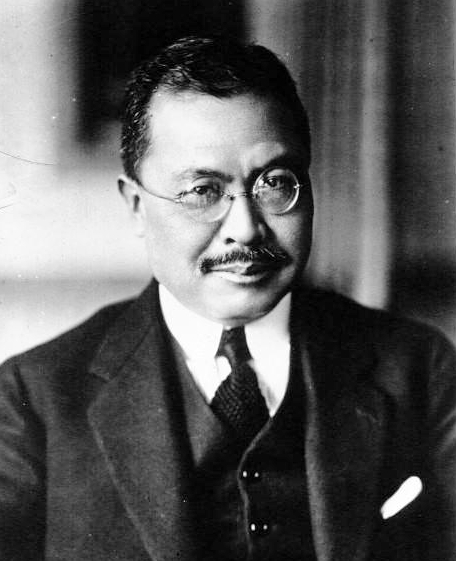 |
| Shidehara Kijuro in 1930 |
Shidehara Kijuro was born in Osaka and educated at the Imperial University of Tokyo. He began his career as a diplomat in 1899; his postings included Korea, the United Kingdom, the Netherlands, and the United States. In his capacity as ambassador to the United States (1919–22), he argued (without success) for the repeal of laws restricting Japanese immigration to the United States.
Shidehara led the Japanese delegation at the Washington Naval Conference (also known as the International Conference on Naval Limitation) in 1921–22, called by the United States to establish security and arms limitations agreements in the Pacific.
He assumed the post of minister of foreign affairs in 1924 and served in this capacity in the years 1924–27 and 1929–31. Shidehara's foreign policy approach was notable for his pursuit of peace and reconciliation rather than aggression and territorial expansion, an approach that became known as Shidehara diplomacy.
  |
This conciliatory approach brought Shidehara into conflict with those individuals in the Japanese government who wanted to pursue more militaristic, expansionist goals, particularly toward China. Shidehara was forced out of office in 1931 after the Manchurian incident, when the bombing of a Japanese railway near Shenyang (Mukden) became a pretext for the Japanese capture of Manchuria from China.
Shidehara was held in high regard abroad even after he left office in Japan. He was well known and popular within the United States. He appeared on the cover of Time magazine in 1931 with the caption "Japan's Man of Peace and War."
After the Japanese surrender in 1945 that concluded World War II, Shidehara, with the approval of the U.S. military occupation authorities, became the first prime minister of postwar Japan. Shidehara appointed Matsumoto Joji to head a commission to draft the new constitution. However, the result was rejected by the U.S. authorities as too similar to the Meiji constitution.
A new constitution that included women's right to vote and a renunciation of war was produced by General Douglas MacArthur's staff and was adopted in 1946. Shidehara was elected to the house of representatives of the diet in 1947, became speaker of the house in 1949, and held this post until his death in 1951.